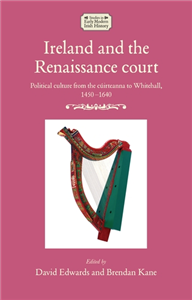Ireland and the Renaissance court
by David Edwards, Brendan Kane
Description
More Information
Rights Information
Albania, Algeria, Angola, Argentina, Armenia, Australia, Austria, Bahrain, Belgium, Belize, Benin, Bolivia, Bosnia and Herzegovina, Botswana, Brazil, Bulgaria, Burkina Faso, Burundi, Cameroon, Canada, Cape Verde, Central African Republic, Chad, Chile, China, Colombia, Comoros, Congo [DRC], Congo, Republic of the, Costa Rica, Ivory Coast, Croatia, Czech Republic, Denmark, Djibouti, Ecuador, Egypt, El Salvador, Equatorial Guinea, Eritrea, Estonia, Ethiopia, Faroe Islands, Finland, France, French Guiana, Gabon, Gambia, Georgia, Germany, Ghana, Greece, Guatemala, Guinea, Guinea-Bissau, Guyana, Honduras, Hongkong, Hungary, Iceland, India, Indonesia, Iran, Iraq, Ireland, Israel, Italy, Japan, Jordan, Kazakhstan, Kenya, Kuwait, Latvia, Lebanon, Lesotho, Liberia, Libya, Lithuania, Luxembourg, Macau, China, Macedonia [FYROM], Madagascar, Malawi, Malaysia, Mali, Malta, Mauritania, Mauritius, Mayotte, Mexico, Mongolia, Montenegro, Morocco, Mozambique, Namibia, Netherlands, New Zealand, Nicaragua, Niger, Nigeria, Norway, Oman, Pakistan, Panama, Paraguay, Peru, Philippines, Poland, Portugal, Puerto Rico, Qatar, Reunion, Romania, Russia, Rwanda, Saint Helena, Sao Tome and Principe, Saudi Arabia, Senegal, Serbia, Seychelles, Sierra Leone, Singapore, Slovakia, Slovenia, Somalia, South Africa, South Korea, Spain, Sri Lanka, Sudan, Suriname, Swaziland, Sweden, Switzerland, Syria, Taiwan, Tanzania, Thailand, Timor-Leste, Togo, Tokelau, Tunisia, Turkey, Uganda, Ukraine, United Arab Emirates, United Kingdom, United States, Uruguay, Venezuela, Vietnam, Western Sahara, Yemen, Zambia, Zimbabwe, South Sudan, Cyprus, Palestine, Bangladesh, Cambodia, Liechtenstein, Azerbaijan, Jamaica, Kyrgyzstan, Dominican Republic, Myanmar, Monaco
Endorsements
This volume sheds fresh light on Irish courts and court culture in the age of the European Renaissance. It contains chapters written by historians and literary scholars working with English, Irish and Latin sources. It is divided into three thematic and roughly chronological sections. The first, 'Indigenous court society in Ireland', considers the European aspects of Gaelic and Gaelicized aristocratic courts prior to the revolutionary religious and political changes instituted by Henry VIII. Looking back as far as the mid-fifteenth century, it demonstrates how Irish elite society was developing in ways similar to those found in England and on the continent. Part II, 'Made in Whitehall: Irish policy and a regnal court', argues that London, rather than viceregal Dublin, must be seen as the center for policy making in the new kingdom of Ireland. How that policy was created, debated, and implemented - or not - is surveyed from both English and Irish viewpoints. The third and concluding section, 'Positioning Ireland in the Renaissance court world', sets Irish élite culture within the broader dynamics of the late Renaissance. Its chapters reveal some of the ways in which Irish people, both at home and abroad, participated in an emergent, multi-lingual republic of letters and transnational intellectual community. Ireland and the Renaissance court is an essential guide to the European aspects of Irish high politics and society and, conversely, the Irish and Gaelic elements of the Renaissance world.
Reviews
This volume sheds fresh light on Irish courts and court culture in the age of the European Renaissance. It contains chapters written by historians and literary scholars working with English, Irish and Latin sources. It is divided into three thematic and roughly chronological sections. The first, 'Indigenous court society in Ireland', considers the European aspects of Gaelic and Gaelicized aristocratic courts prior to the revolutionary religious and political changes instituted by Henry VIII. Looking back as far as the mid-fifteenth century, it demonstrates how Irish elite society was developing in ways similar to those found in England and on the continent. Part II, 'Made in Whitehall: Irish policy and a regnal court', argues that London, rather than viceregal Dublin, must be seen as the center for policy making in the new kingdom of Ireland. How that policy was created, debated, and implemented - or not - is surveyed from both English and Irish viewpoints. The third and concluding section, 'Positioning Ireland in the Renaissance court world', sets Irish élite culture within the broader dynamics of the late Renaissance. Its chapters reveal some of the ways in which Irish people, both at home and abroad, participated in an emergent, multi-lingual republic of letters and transnational intellectual community. Ireland and the Renaissance court is an essential guide to the European aspects of Irish high politics and society and, conversely, the Irish and Gaelic elements of the Renaissance world.
Author Biography
David Edwards is Senior Lecturer in History at University College Cork;
Manchester University Press
Manchester University Press is a leading UK publisher known for excellent research in the humanities and social sciences.
View all titlesBibliographic Information
- Publisher Manchester University Press
- Publication Date August 2024
- Orginal LanguageEnglish
- ISBN/Identifier 9781526177292 / 1526177293
- Publication Country or regionUnited Kingdom
- FormatPrint PDF
- Pages352
- ReadershipGeneral/trade; College/higher education; Professional and scholarly
- Publish StatusPublished
- Dimensions234 X 156 mm
- Biblio NotesDerived from Proprietary 5895
- SeriesStudies in Early Modern Irish History
- Reference Code15660
Manchester University Press has chosen to review this offer before it proceeds.
You will receive an email update that will bring you back to complete the process.
You can also check the status in the My Offers area

Please wait while the payment is being prepared.
Do not close this window.



